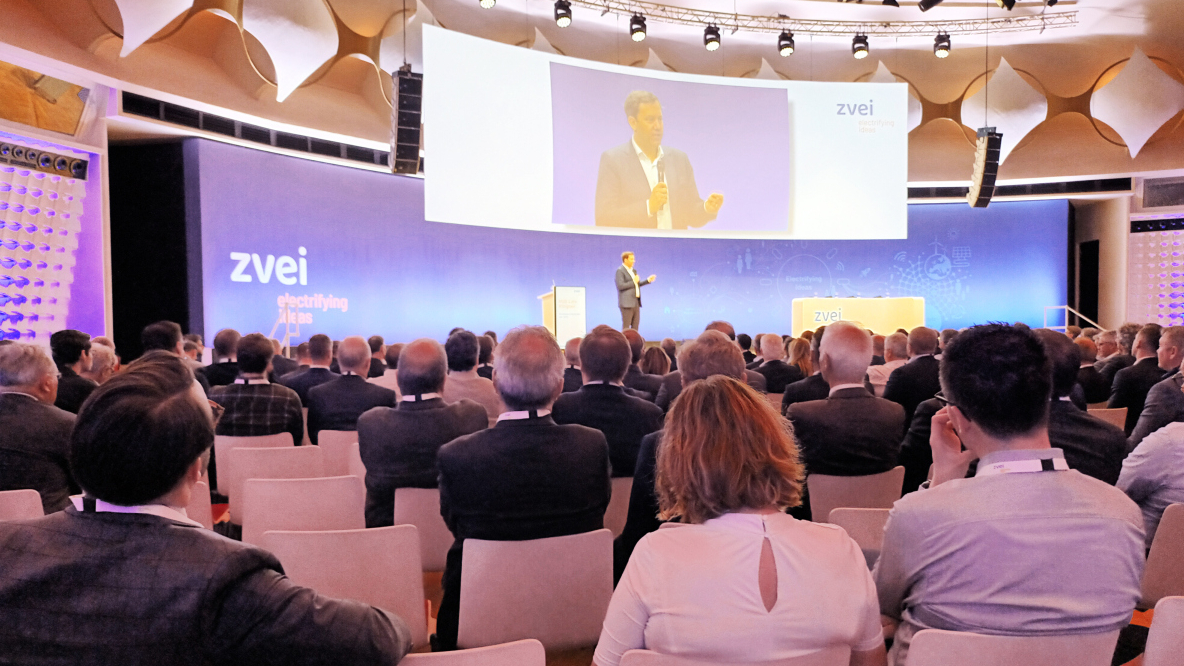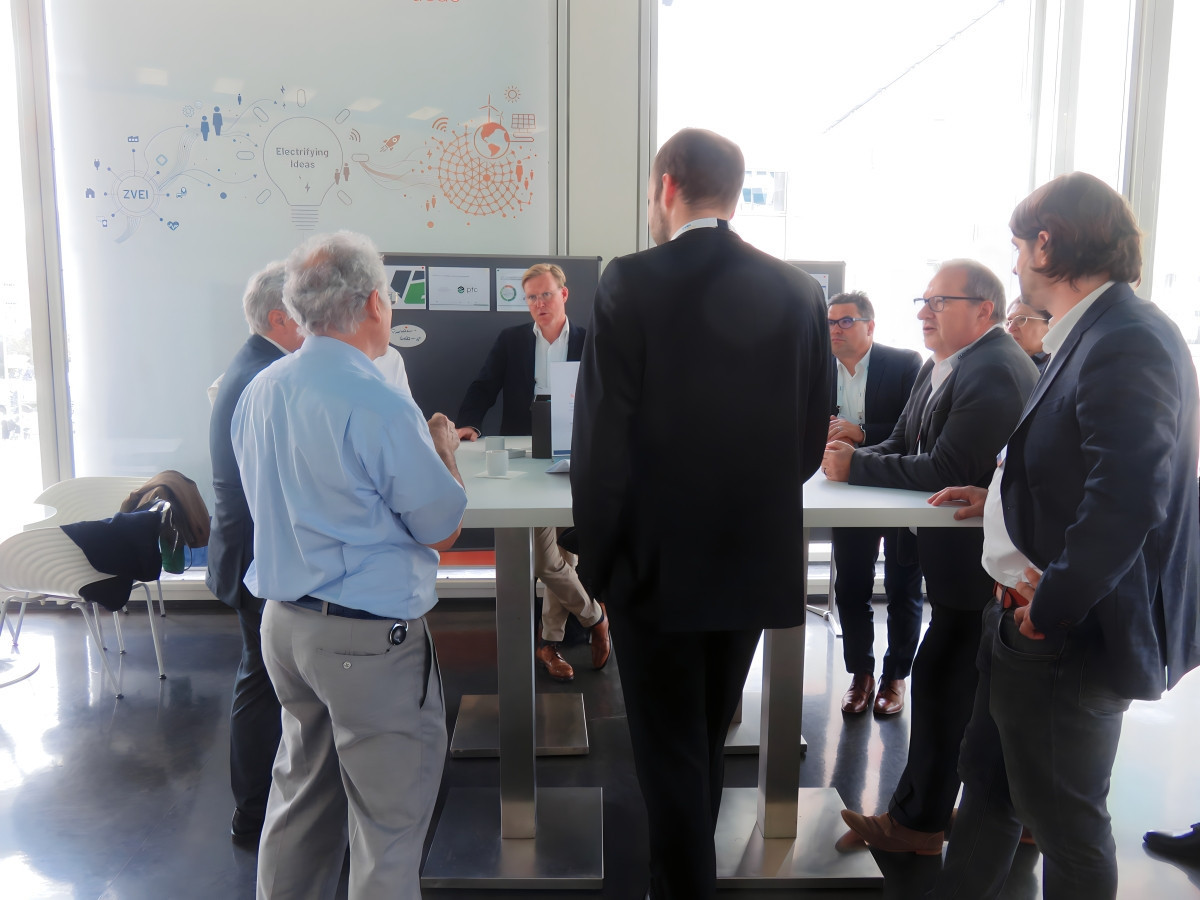The ZVEI has developed a vision for the future with its target image of the 'all-electric society'. At the ZVEI Annual Congress 2023, high-caliber individuals from politics, business, science and society discussed where we currently stand, what challenges need to be solved next and what opportunities will arise. There is still a lot to be done to achieve the climate targets.
Over 600 participants attended the two-day event with seven discussion rounds, eleven keynotes and presentations as well as a supporting program. Three members of the German government and a prime minister were among the speakers. The feedback was consistently positive. The atmosphere was very good, as there was not only a lot of applause, but also many a laugh.
The presentations and discussions focused on the opportunities presented by electrification, digitalization, AI and future technologies such as Manufacturing-X. 'Doing is like wanting, only more blatant' is one of the lessons learned at the ZVEI annual congress in Berlin. Everyone agreed: the green and digital transformation must finally get underway. Because wasting time is no longer an option. The ZVEI addressed this message to politicians in no uncertain terms. "We are convinced that the climate targets are achievable and that the transition to a climate-neutral industrial society can succeed," said ZVEI President Dr. Gunther Kegel, who was confirmed in office for a further three years by the ZVEI Executive Board this morning. "The next huge wave of electrification is underway."
Electric, digital, sustainable: how we achieve this
After the opening speech by moderator Astrid Frohloff, Dr. Kegel addressed the need for a circular economy, and not just in Europe. This is the only way to achieve the climate targets. The energy transition is an energy efficiency transition. This requires a competitive electricity price for everyone. A digital passport for products is a basic prerequisite for the circular economy.
This was followed by the keynote speech by Steffi Lemke, Member of the German Bundestag and Federal Minister for the Environment, Nature Conservation, Nuclear Safety and Consumer Protection. Due to the environmental risks posed by climate change, pollution and species extinction, the entire product life cycle must be considered and new solutions developed. This includes new eco-design guidelines that also require products to be repairable.
Moderated by Astrid Frohloff, the discussion on 'Digitalization' followed, in which the planned PFAS ban and its effects were also discussed, as sustainability was the focus. Steffi Lemke and Dr. Gunther Kegel agreed that digital product passports will replace paper documents, as they are a crucial key to sustainability.
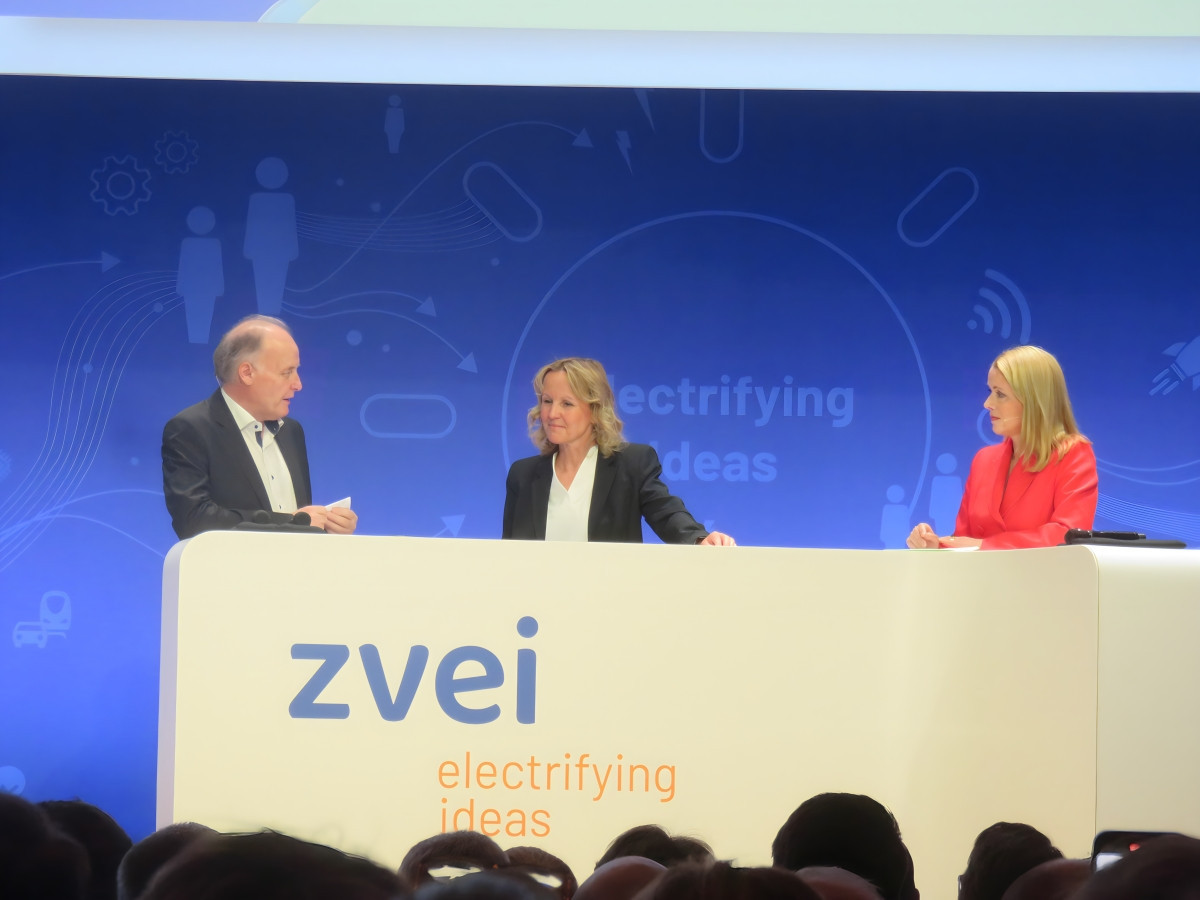 Dr. Gunther Kegel, Steffi Lemke and Astrid Frohloff during the 'Digitalization' discussion
Dr. Gunther Kegel, Steffi Lemke and Astrid Frohloff during the 'Digitalization' discussion
Where Germany is leading and where it is not (yet)
In keynote speeches, Cedrik Neike, Member of the Management Board of Siemens and ZVEI Vice President, Dr. Volker Wissing, Member of the German Bundestag and Federal Minister for Digital and Transport Affairs, and Jochen Hanebeck, CEO of Infineon, showed where Germany stands and what opportunities it has.
Cedrik Neike began by describing the situation in Germany and worldwide. In Germany: the most modern 5G factory but not a mobile network everywhere, overregulation and only a third of the technology electrified so far, of which only a third is powered by renewable energy. Worldwide: more factories than ever are being built and more people are leaving the workforce in the G7 countries than will follow. The world loves IT (information technology) but runs on OT (operational technology). He said that in the current golden age of automation and digitalization, it is important to bring IT and OT together. He illustrated what this means in practice using the example of battery technology, the heart of electric vehicles and for their manufacturers. Although the technology is not yet fully developed, plans are already underway for 175 gigafactories worldwide. The main problems are the high water consumption and production waste. The battery design, production and recycling processes must be thought through from the outset in order to optimize battery technology. With digital twins of products, machines and factories as well as AI (artificial intelligence), rapid optimizations towards green batteries can be achieved. With its strengths in engineering, Germany has the opportunity here to bring IT and OT together in order to offer optimal solutions and become a leader, which the ZVEI Manufacturing-X initiative, among others, should contribute to.
Jochen Hanebeck emphasized that hydrogen technology is needed to enable comprehensive decarbonization. New concepts are also needed in conjunction with digitalization.
"The transition to a climate-neutral industrial society can succeed."
ZVEI PresidentGunther Kegel
Everything in flux: What the electricity market design of the future must look like
The expansion of renewable energies and the digitalization of the grids must be further accelerated. This is because electrification based on renewable energies, the digitalization of grids and the intelligent coupling of the climate-relevant energy, mobility and building sectors in particular open up enormous potential for savings and efficiency and pave the way to climate neutrality. Prof. Dr. Veronika Grimm, member of the German Council of Economic Experts, Klaus Müller, President of the Federal Network Agency (online) and Wolfgang Weber, Chairman of the Management Board of ZVEI, took part in the keynote speeches and the discussion on the electricity market of the future. The focus is on the electricity price and its development. In general, entrepreneurial initiative should be strengthened and overregulation should be eliminated.
Fresh ideas: How we create a culture of innovation
Lea Emmel, Risk Manager at Dräger, Doris Höpfl, Member of the Executive Board at Harting, Member of Parliament Tilman Kuban, CDU/CSU parliamentary group and Michael Marhofer, CEO of ifm electronic, discussed how a culture of innovation can be created.
Presentation of the 'Electrifying Ideas Award'
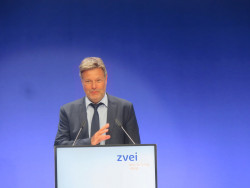 Dr. Robert Habeck during the keynoteAfterthe presentation of the finalists of the Electrifying Ideas Awards and a get-together as a warm-up, the award ceremony followed, which Dr. Gunther Kegel opened with an introduction. The Electrifying Ideas Awards were presented for the first time. With this award, the ZVEI honors ideas that can help us on our way to a climate-neutral future. There were 65 submissions in total. An independent jury of high-caliber experts from business, research, politics and society nominated six companies for the first 'Electrifying Ideas Award'. "The number and quality of the ideas submitted was impressive - especially since we only launched the award this year," said ZVEI President Dr. Gunther Kegel. "As diverse as the nominated projects are, what they have in common is that they will take us a good step forward on the road to an all-electric society. They will help us to make better use of resources, simplify processes and distribute energy more intelligently. The two winning ideas demonstrate this in particular. Both have great potential for innovation and can contribute to advancing the energy transition in the building sector and the sustainable future of hydrogen."
Dr. Robert Habeck during the keynoteAfterthe presentation of the finalists of the Electrifying Ideas Awards and a get-together as a warm-up, the award ceremony followed, which Dr. Gunther Kegel opened with an introduction. The Electrifying Ideas Awards were presented for the first time. With this award, the ZVEI honors ideas that can help us on our way to a climate-neutral future. There were 65 submissions in total. An independent jury of high-caliber experts from business, research, politics and society nominated six companies for the first 'Electrifying Ideas Award'. "The number and quality of the ideas submitted was impressive - especially since we only launched the award this year," said ZVEI President Dr. Gunther Kegel. "As diverse as the nominated projects are, what they have in common is that they will take us a good step forward on the road to an all-electric society. They will help us to make better use of resources, simplify processes and distribute energy more intelligently. The two winning ideas demonstrate this in particular. Both have great potential for innovation and can contribute to advancing the energy transition in the building sector and the sustainable future of hydrogen."
Before the award ceremony, Dr. Robert Habeck, Federal Minister for Economic Affairs and Climate Protection, gave a keynote speech on the situation caused by climate change and other crises and the planned measures. Having previously visited the exhibition, he said: "It's great to see what's happening. Thank you for this work, for showing Germany what transformation can mean and for implementing what is only ever described politically and socially. A great achievement." He later continued: "The global competition for the new green technologies has long since begun. We have to change because the world is changing. Otherwise we will jeopardize prosperity." The expansion of renewable energies and the expansion of the grid must be accelerated, he said, taking into account security of supply and affordability. A pragmatic approach is required here, but clarity of purpose. The economic goal is to renew prosperity. He concluded by thanking the ZVEI for its activities aimed at the all-electric society as a contribution to this.
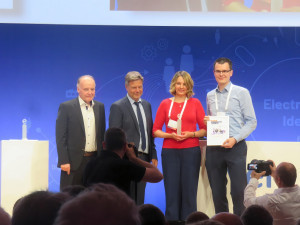 Awarded to Hager GroupInthe "Established Companies" category, Hager Group won for its idea of peer-to-peer power trading, a decentralized and self-regulating energy system in residential districts. "The aim of this idea is to distribute energy more fairly. Those who consume less can sell power and generate revenue. This allows all households to participate in the energy transition. In addition, investments in grid expansion can be reduced," said Daniel Hager, CEO of Hager Group, explaining the concept.
Awarded to Hager GroupInthe "Established Companies" category, Hager Group won for its idea of peer-to-peer power trading, a decentralized and self-regulating energy system in residential districts. "The aim of this idea is to distribute energy more fairly. Those who consume less can sell power and generate revenue. This allows all households to participate in the energy transition. In addition, investments in grid expansion can be reduced," said Daniel Hager, CEO of Hager Group, explaining the concept.
Green hydrogen is on everyone's lips with regard to the energy transition. Its production is to be greatly expanded in the coming years through electrolysis. This is where Semodia GmbH's idea, which won the 'Newcomer' category, comes in. "Electrolysis plants must be scalable on a large scale in the future," said Anna Menschner, co-founder and Managing Director of Semodia. "Using the Module Type Package (MTP) standard greatly simplifies and significantly accelerates planning, commissioning and numbering-up. This means that capacity in the high gigawatt range can be built up quickly and in a resource-saving manner."
The presentation of the Electrifying Ideas Awards was followed by a talk between the award winners and Federal Minister Dr. Robert Habeck. The first day ended with an evening event.
Tenor of the second day: Sustainably successful - We can do it!
The second day of the conference opened with a keynote speech by MP Lars Klingbeil, Federal Chairman of the SPD. He commented on the planned GEG and the urgently needed but sluggish expansion of the energy grid, stating that the coalition will be judged on this and said: "We can no longer afford to take small steps." With regard to the regulatory requirements, he stated: "We need a Europe almost". The subsequent discussion on 'A turning point for industry: a booster for industrial policy' with Dr. Sarah Schniewindt, Managing Director of Schniewindt, delved deeper into the topic.
In keynote speeches and a panel discussion, Matthias Altendorf, CEO of Endress+Hauser, Mikko Huotari, Director of Merics, MEP Angelika Niebler, Group of the European People's Party, and Laurent Tardif, President of FIEEC, discussed the possibilities, requirements and opportunities for more joint creative power in the European Union.
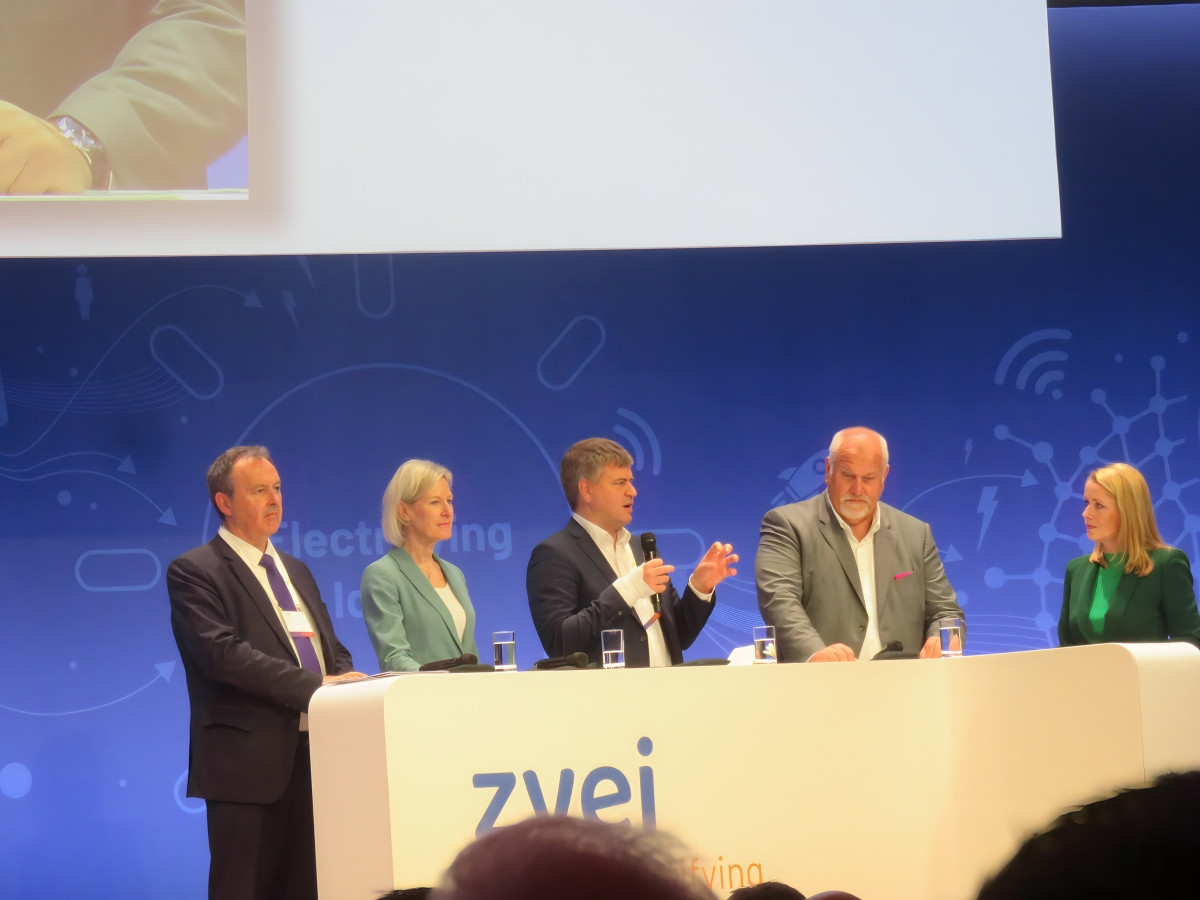 Laurent Tardif, Angelika Niebler, Mikko Huotari, Matthias Altendorf and Astrid Frohloff discussed the turning point for Europe
Laurent Tardif, Angelika Niebler, Mikko Huotari, Matthias Altendorf and Astrid Frohloff discussed the turning point for Europe
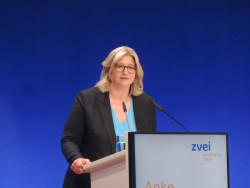 Anke Rehlinger, Minister President of the SaarlandMdBDr. Lukas Köhler, Deputy Chairman of the FDP parliamentary group, Dr. Frank Possel-Dölken, CDO and Member of the Management Board of Phoenix Contact, and Philipp Steinberger, CEO of Wöhner, discussed future technologies and in particular the benefits that Manufacturing-X and the DC industry will have, after making brief statements on the subject.
Anke Rehlinger, Minister President of the SaarlandMdBDr. Lukas Köhler, Deputy Chairman of the FDP parliamentary group, Dr. Frank Possel-Dölken, CDO and Member of the Management Board of Phoenix Contact, and Philipp Steinberger, CEO of Wöhner, discussed future technologies and in particular the benefits that Manufacturing-X and the DC industry will have, after making brief statements on the subject.
In the closing speeches, Anke Rehlinger, Minister President of Saarland, and Stephan von Schuckmann, Member of the Board of Management of the ZF Group, used examples to show how 'sustainably successful' can be achieved and they are certain that "We can do it!".
After the lunch break, there were moderated discussions in 'Interactive Round Table Sessions' on artificial intelligence/data science from Endress+Hauser, cyber security from Phoenix Contact, the supply chain from PTC and the digital twin from Rittal. This was a great opportunity to discuss these topics with the experts.
After the congress, we can take a more optimistic view of the fact that politicians are providing the right framework for the transition to a climate-neutral industrial society that enables entrepreneurial initiative and does not stifle it through over-regulation. This is because politicians are aware of existing weaknesses and are promising to remedy them. The 'All-Electric-Society' shows the way.
The date for the next ZVEI Annual Congress is May 16 and 17, 2024 in Berlin.

